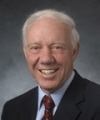Oberstar Raises 100 Percent of Q2 2009 Itemized Individual Contributions from Out of State

Eighteen-term DFLer Jim Oberstar (MN-08) has perfected this into an art form, as evidenced in the second quarter of 2009, when the Congressman raised 100 percent of his individual itemized contributions from people from outside of the Gopher State.
Oberstar raised $131,500 of such individual contributions (those in quantities of $200 or more) in the second quarter of this year – good for the second most among Minnesota’s U.S. House delegation, behind Republican Erik Paulsen (at $186,600).
Last quarter, Oberstar raised 26.2 percent of his large-donor individual funds from Minnesotans – with 40 percent of such contributors coming from Gopher State residents (50 of 125). However, in the new second quarter period, every one of Oberstar’s 129 large donor contributors were from out of state.
Forty percent of such contributors came from Texas, donating 53.8 percent of Oberstar’s individual itemized funds for the quarter.
Not only did the Congressman fail to raise any money from Minnesota, but he raised only $1,000 in the Upper Midwest (Iowa) and just $2,500 in the Greater Midwest (adding $1,000 in Ohio and $500 in Missouri).
Q2 2009 Individual Itemized Contributions to Rep. Jim Oberstar
|
State
|
Contributors
|
Amount
|
|
Texas
|
52
|
$70,800
|
|
District of Columbia
|
12
|
$6,550
|
|
California
|
8
|
$5,300
|
|
Louisiana
|
7
|
$7,000
|
|
Virginia
|
6
|
$4,250
|
|
New Jersey
|
6
|
$3,500
|
|
Connecticut
|
5
|
$6,500
|
|
Massachusetts
|
5
|
$3,000
|
|
Tennessee
|
4
|
$6,300
|
|
Maryland
|
4
|
$2,000
|
|
Pennsylvania
|
4
|
$2,000
|
|
New York
|
3
|
$5,300
|
|
Mississippi
|
2
|
$2,000
|
|
Florida
|
2
|
$1,500
|
|
Kentucky
|
2
|
$1,500
|
|
Iowa
|
2
|
$1,000
|
|
Ohio
|
2
|
$1,000
|
|
Oregon
|
1
|
$1,000
|
|
Missouri
|
1
|
$500
|
|
Vermont
|
1
|
$500
|
|
Total
|
129
|
$131,500.00
|
Source: FEC data compiled by Smart Politics.
Oberstar’s reliance on fundraising from individuals outside the Gopher State (and PACs) brings into focus the larger picture from this quarter’s fundraising – Minnesota’s three GOP U.S. Representatives raised nearly triple the funds from Minnesota residents than its five DFLers.
In fact, freshman GOPer Erik Paulsen raised more such funds for his campaign from residents of Minnesota ($165,515) than all five DFL members of the U.S. House combined ($120,046).
Overall, Paulsen, Kline, and Bachmann collectively raised 74.2 percent of itemized individual contributions from Minnesota this quarter ($345,360), compared to just 25.8 percent from Walz, Ellison, Peterson, McCollum, and Oberstar.
In Q1 2009, the Republican trio raised 73.4 percent of such itemized contributions. Not coincidentally, the state’s largest median household incomes are those located in Congressional districts represented by Paulsen ($73,229), John Kline ($72,416), and Michele Bachmann ($67,832). Only Betty McCollum represents a district with a median household income above $50,000 among the five DFLers in the U.S. House ($53,688).
Q2 2009 Individual Itemized Contributions by Minnesotans to Minnesota U.S. Representatives
|
Rank
|
Representative
|
Amount
|
Percent
|
|
1
|
Erik Paulsen (GOP)
|
$165,515
|
35.5
|
|
2
|
John Kline (GOP)
|
$94,525
|
20.3
|
|
3
|
Michele Bachmann (GOP)
|
$85,320
|
18.4
|
|
4
|
Tim Walz (DFL)
|
$77,520
|
16.6
|
|
5
|
Keith Ellison (DFL)
|
$18,650
|
4.0
|
|
6
|
Collin Peterson (DFL)
|
$12,151
|
2.6
|
|
7
|
Betty McCollum (DFL)
|
$11,725
|
2.5
|
|
8
|
Jim Oberstar (DFL)
|
$0
|
0.0
|
|
Total
|
$465,406
|
100.0
|
|
Source: FEC data compiled by Smart Politics.
DFLers, meanwhile, relied much more heavily on PAC money to build their campaign warchests this quarter, raising 60.8 percent of all PAC money given to Minnesota U.S. Representatives from April through June.
Follow Smart Politics on Twitter.

Money raised from outside one’s congressional district–regardless of whether or not it’s from Minnesota–is just as bad as money raised outside the state. E.g., money from wealthy Lake Minnetonka millionaires has no more business flowing into the 6th CD than does money from, say, Hollywood liberals. To pretend otherwise is to ignore half the problem with money in politics.